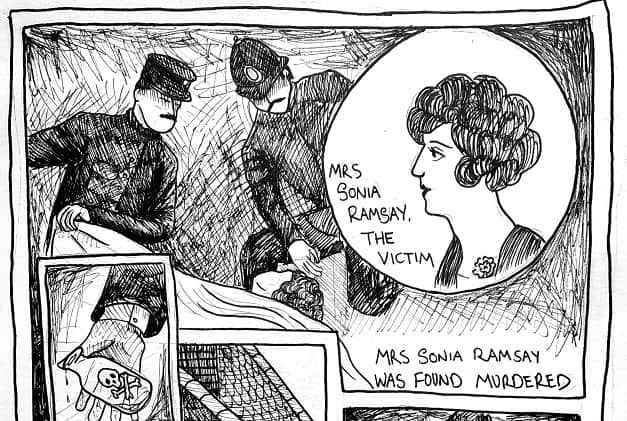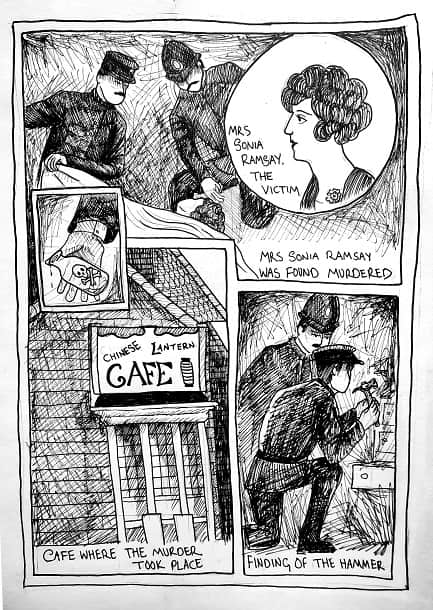
During the early summer of 1927 the popular periodical author and novelist Louise Heilgers (today all but forgotten) was travelling to her home in Yorkshire. ‘…at York I bought an evening paper,’ she later wrote for The Weekly Dispatch. ‘Opening I saw the words “Chinese Café – murder – Mrs Ramsay”. It was a full minute before I realised that it was my own sister about whom I was reading.’
Louise’s sister, Sonia Ramsay (36), had been discovered battered to death in an upstairs room over a Broadstairs café she ran with a man called Charles Robinson (54). Her body had been found by her mother, Josephine.
Described as petite, affable, and possessing a vivacious spirit, Sonia had moved to Broadstairs with her invalid husband and three sons in 1924. She had opened the Chinese Lantern Café, with its Oriental themed décor, some two years later.
Her husband David, a pilot during the Great War, had been seriously injured in an air accident; an incident which, according to Louise, had ‘ruined’ Sonia’s Bohemian lifestyle and confined David to an ‘existence which was a living death’.
Charles Robinson, a qualified nurse, had initially been employed by the Ramsays as David’s carer. But as Sonia’s mother would later tell the Coroner’s inquest, he had soon after begun to take ‘liberties’.

The polar opposite in personality to Sonia, Robinson’s backstory is marred with personal tragedy and mental ill-health. Some years earlier his sister had murdered her children and then committed suicide. His brother had also died in mysterious circumstances, which, according to his daughter Constance, were ‘never spoken about’. All of which contributed to Robinson, himself, having a mental breakdown resulting in fits of depression and a change in his general personality.
According to Josephine Heilgers, shortly after beginning his situation Robinson soon tried to assert his authority over the household, took his meals with the family and ‘pressed his attentions’ upon Sonia ‘with great persistence’ — which were vehemently rebuffed.
As a result Robinson began to criticize Sonia’s moral behaviour and took offence to her socialising with friends and attending dancehalls. David Ramsay more than once had to remind him that Sonia was her own woman and could do as she pleased.
With these character-traits why did Sonia go into business with Robinson?
According to press reports, Robinson had invested £150 (around £9,485 today) into the café, which was soon in financial trouble. Speaking to the Daily Herald one of Sonia’s friends described her as a ‘clever woman’ and a ‘good conversationalist’ but lacking a ‘keen sense of business’. Sonia’s cavalier attitude towards money was a regular cause of animosity between Robinson and her. By the time of her death the café had six months’ rent arrears, owned suppliers money and was due to have the phone disconnected.
On the evening of May 31 Sonia had planned to go dancing. When her mother found her daughter’s room empty the following morning and her bed not slept in she headed for the café. With no sign of either Sonia or Robinson downstairs Josephine went upstairs. A trail of bloody footprints leading from one bedroom to another was the first sign that something terrible had occurred.
A police search of the premises revealed a man’s blood-soaked trousers and jacket, a joiner’s hammer caked with congealed blood and an eight-page confession by Robinson. The room where Sonia’s body laid also showed signs of a struggle.
The confession was addressed to Robinson’s wife whom he had left shortly after being employed by the Ramsays. In it he apologizes for the ‘great deal of pain and trouble’ his actions will cause her and then makes reference to his long-standing fight with depression. He then makes allegations against Sonia, calling her the ‘most violent woman on God’s earth’. He then makes this chilling statement:
I told her a month ago, if I found her out I would show her no mercy. I have no fear. I am quite prepared for my long sleep. There will be no need for any description to be circulated of myself. It will be no use. My body is my own, and I will do as I like with it. Had this woman only been frank with me and told the truth it would have been all right.
Robinson’s unconscious body was found by a labourer twenty-four hours later among bushes at North Foreland. He was rushed to Ramsgate General Hospital but later died. The poison he took was never identified.
It was rumoured that Sonia and Robinson had been having an affair. But as Louise Heilgers stated in her eulogy to Sonia: ‘…no one will ever know what passed between my sister and Robinson. That secret is in the grave’.

